Should we be changing human DNA because we can?
That's the big issue during The Exploration Place's Adult Speaker Series when UNBC chemistry professor Stephen Rader presents the topic of designer babies and gene editing Monday at 7 p.m.
"What I'm really trying to do with this talk is start a conversation because this is the first time in the history of life on Earth that an organism can change its own DNA," Rader said.
"That gives humanity this incredible power that we really have no idea yet what to do with and this isn't something that scientists should decide in the secrecy of their labs or some government agency should tell us what to think about it. This is something that everybody needs to talk about and be able to express their opinions about."
Is this something that is too dangerous and should it be used at all?
"Or yes, this is something we should consider but only for diseases, or the sky's the limit and let's do whatever anybody wants and we can have our free market and designer children and who knows," he said.
During the talk on Monday, Rader said he will spend a bit of time explaining the technology so people can understand what scientists are doing right now is pretty limited.
"Basically we can make one little edit at a time and a lot of things people would like to do like make super-genius babies or children who have X-ray vision - those sorts of things would require wholesale changes to our DNA which we're nowhere near able to do," he explained. "In some ways it's a bit comforting that some things are totally out of range technologically and probably will be for decades or centuries so it'll be somebody else's problem to deal with but even today there are decisions to be made and people have to understand what the limitations are and also what the risks are."
Scientists today are hoping that the procedure will be very precise, making a change in only one place and that's the only thing that happens.
"But there's evidence that's not always the case," Rader said.
Rader will also talk about what he's doing in his research at UNBC and what changes can be made to DNA that will be helpful, what the limitations are, and of course, the ethics and politics of the volatile subject matter.
In current news is the report of a Chinese scientist who claims to have gene edited babies as part of the in vitro process and Rader will use that information as talking points to start a discussion with the audience.
"It's kind of incredible we're at what could be an inflection point in the history of humanity that we now have access to this technology that is unlike anything that's ever existed," he said.
"And I'm hoping there will be an extended and engaging discussion about it Monday night."
Doors open at The Exploration Place, 333 Becott Place, Monday at 6:45 p.m.



